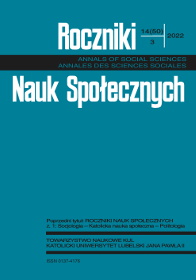AMBIWALENTNE I PROBLEMOWE RELACJE W SIECIACH KREWNYCH: REKONESANS
AMBIVALENT AND PROBLEMATIC RELATIONSHIPS ACROSS KINSHIP NETWORKS: RECONNAISSANCE
Author(s): Iwona PrzybyłSubject(s): Family and social welfare, Social Norms / Social Control, Identity of Collectives
Published by: Towarzystwo Naukowe KUL & Katolicki Uniwersytet Lubelski Jana Pawła II
Keywords: ambivalent relationship; problematic relationship; family roles; kinship networks; inter- generational relationship;
Summary/Abstract: The aim of this article is to present the results of empirical research on ambivalent and problem relationships inside the kinship network in three groups: early adulthood, middle-aged adult and younger senior. The research also included the question of family roles that evoke am- bivalence. The study was conducted in 2021 on a sample of 109 adult person ages 20-69 who completed diagrams of their close and problematic relationships. Social ties were classified as solely close, solely problematic, or ambivalent, based on the network placement. Findings of this study indicates that overarching sentiments toward relationships differ as a function of the degree of closeness one has to different relatives, intensity of close feelings toward the family member, and individuals’ ages. Dyads that evoke ambivalence are: sister–sister, mother–daughter, son–father, brothe–brother and relationhips: son–mother and sister–brother. Relationships with aunts and co- usins are also classified as problematic. In the last part on this study the author indicates reasons for producing ambivalence in these nodes of kinship network uses the power-status theory of emo- tions, developed by Theodore D. Kemper.
Journal: Roczniki Nauk Społecznych
- Issue Year: 50/2022
- Issue No: 3
- Page Range: 83-106
- Page Count: 24
- Language: Polish

